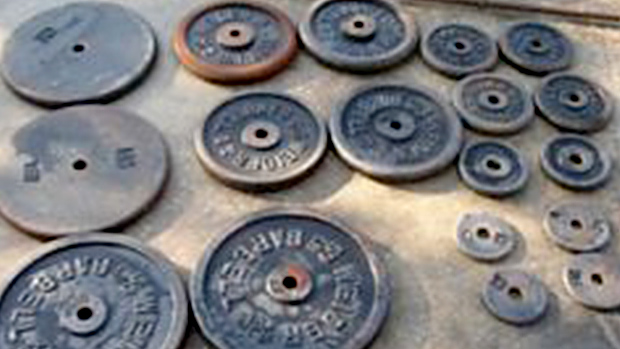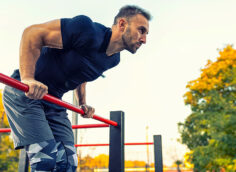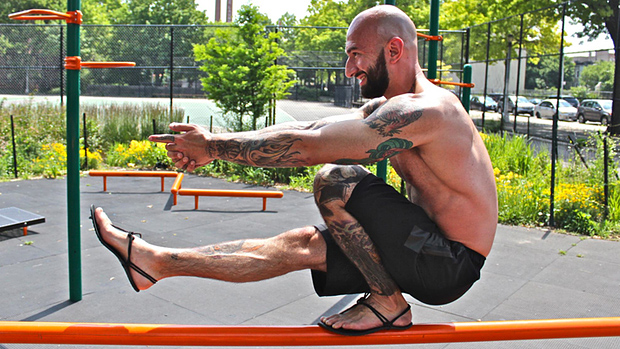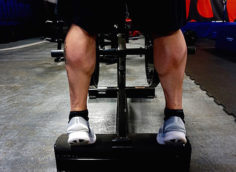Fat loss and conditioning are of course essential in any serious
training program, but most athletes demand power, strength, speed,
athleticism, and proper timing and balance as well. Combos do all these things, and if you're a bodybuilder
who's new to them, they'll also shock your body into new
growth.
The benefits for training with hybrids/complexes/combos, in
addition to fat loss and athletic development, go on and on.
They can provide a great way to warm-up, improve mobility by
exercising through a greater ROM, help teach technique and form in
difficult lifts, as well as provide more time efficient workouts,
especially when training larger groups of athletes.
 |
 |
One does combos and one doesn't.
No matter what you use them for, this style of lifting is no
joke. It requires mental focus, determination, and stamina to
finish a series correctly. I'm sure most athletes and
gym rats would much rather bang out a set of curls or flies
(unfortunately for our athletes, we ban flies in our facility), but
the benefits of using these lifts are indisputable.
This article will show you some of the variations of Combos,
Complexes, and Hybrids that our facility has used successfully for
athletic development. The majority of our hybrid/complex movements
involve Olympic style lifts and basic multi-joint exercises using
both barbells and dumbbells.
[Editor's Note: If you consider yourself a weightlifter and
you've never done O lifts before, why the hell not?
That's like being a wedding singer who doesn't know any
Celine Dion songs...or something like that. Anyhow, here's
your chance to start to learn them – Jeremy's provided plenty
of great videos below.]
We separate our combo's and complexes into two categories:
total body Olympic and total body non-explosive. The total
body Olympic group will, of course, be comprised of Olympic lift
variations like power cleans, hang cleans, push presses, split
jerks and snatches as well as front squats and presses.
These exercises are used to improve starting strength,
supporting strength and the rate of force development while hitting
all major muscle groups from head to toe.
The total body-non explosive combo's will consist of
exercises like lunges, RDLs, high pulls, squats and rows.
Although these combo's do not require a high amount of bar
speed to complete the lift, we try and emphasize the importance of
completing the concentric portion of each rep as fast as
possible.
The non-explosive combos work great to promote the development
of strength, strength endurance, hypertrophy, mobility,
conditioning, and in some cases, regeneration. I could sit here all
day and spew boring descriptions of these exercises, but
where's the fun in that? If you're anything like me
you'd rather watch a few videos, so here are a
few.
This first video demonstrates one of our favorite complexes we
use with our advanced athletes. After we teach the exercises
individually, and the athlete shows a sufficient knowledge of each
lift, we challenge the athlete by combining the lifts into a very
demanding Combo.
This is where the combination lift's versatility really is
proven. Not only does it demand great total body strength and
power through a full range of motion, it also requires the mental
focus and physical sharpness to complete the lifts in a coordinated
series. I wish the jerk at the end of this next video was a
little faster and cleaner, but I guess I'll just have to work
on my overhead training a bit more to remedy that
deficiency.
<!--
-->
Your author doing: Power Clean/Hang Clean-Front Squat/Spilt
Jerk (press)
This next Combo is very difficult, especially for any athlete
with mobility issues. It combines the speed and athleticism
required for snatches with the pure mobility, balance and
supporting strength necessary to complete a full overhead
squat.
With snatches and overhead squats, speed and proper form are
most important, not load. Start light and do them correctly
to maximize the benefits. We've found that many athletes
do not need to use a lot of weight on this combo. Some
younger athletes can get benefits using only an empty
barbell. The bar speed stays high and they can really
concentrate on dropping into that overhead squat.
<!--
-->
Hang Split Snatch x 2/ Hang Snatch/Overhead Squat
This next combination focuses a little more on power and later
brings in the strength-endurance needed to complete the set.
This particular combination has a much broader range of
applicability than the last example we discussed.
It can be used as a way of hammering home technique in three
separate movements for our beginner athletes, and also as a tool
for developing necessary power and strength within our more
advanced trainees. I like this sequence because the athlete
can first complete two explosive reps with the clean and jerk while
they're fresh, and then rely more on strength and endurance to
finish the set of front squats.
With a high enough load, the first two clean and jerk movements
should wear enough on the athlete that the front squats should
become very difficult in the later sets. These truly demand a
form of mental preparation to push through 4-6 sets with a high
intensity.
<!--
-->
Hang Clean & Jerk x 2/Front Squat x 3
The next example is the first of our non-explosive total body
combinations. This sequence, with proper form and a decent
amount of weight, will crush the posterior chain very efficiently
by effectively working every muscle from your calves to your
traps.
The glutes, hamstring, and erectors really have to work, first
getting a slow eccentric contraction while lowering the weight,
added to an isometric hold in the stretch position, followed by a
semi-explosive concentric repetition. These qualities combine
to create a rather valuable strength movement.
A rep usually consists of 1 RDL/2 bent over rows/1 Shrug pull
and we often have our athletes do 3-4 sets of 3 reps. The
video shows this movement being performed using a barbell but it
works well using dumbbells as well, if that's what you
prefer.
<!--
-->
RDL/Bent Over Row x 2/Shrug Pull
The next two videos are identical in movements, though they
differ in the sequence in which they're performed. They
both consist of RDL/High Pull-clean/Squat-press. Whether you choose
to complete the required reps of each individual movement before
moving onto the next, or complete 1 rep of each movement and then
repeat, is up to you (or up to me in the case of our
athletes!). The videos should clear up any
confusion.
<!--
-->
RDL x 5/High Pull-Clean x 5/Squat-Press x 5
<!--
-->
RDL/Clean/Squat-Press x 5
You can use either barbells or dumbbells for the previous
movement, but realize that the use of dumbbells will require more
coordination, body control, and balance, so switch it up now and
then. It really doesn't matter how you choose to perform
this combo, but I guarantee you'll notice how effective it is
in developing total body strength while providing a great tool for
conditioning an athlete.
Our last example is the answer for any athlete desiring a
"Big Finish" to a hard workout or great training
week. Sometimes a "good" week just isn't
satisfying enough for many of our athletes. They want to be
slumped on the turf in a pool of sweat, convinced they've
pushed themselves to great gains.
The only thing left in the tank is just enough strength to shake
up their Surge post workout protein drink. If you're one
of those sick bastards who craves a little pain, this hybrid
usually does the trick. It not only works almost every major
muscle in the body, it also crushes your cardiovascular system to
boot.
<!--
-->
The Full Body Finisher: DB RDL/Bent Over Row/High
Pull/Alternating Lunge and Press
Hopefully the benefits of this method of training for athletic
development are now apparent. Understand that the examples
I've shown are just a few of my favorites. Over the past
year or so I've come to realize that the possible variations
of these lifts are limited only to one's imagination.
We all know how important variation and change is throughout
long term training programs so the ability to adjust and modify
these combinations merely adds to their overall worth.
Whether you like the examples I've shown or you have favorites
of your own, try them, adjust them, and add to them to take your
training to new levels.
If you use any variations that the readers and I can benefit
from, please share the wealth!




